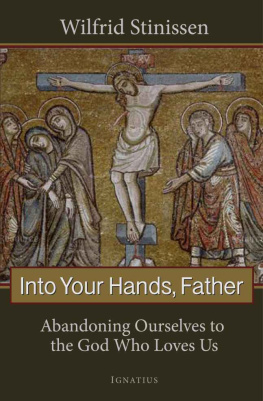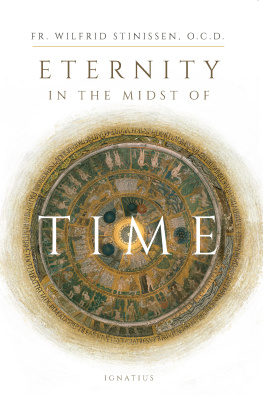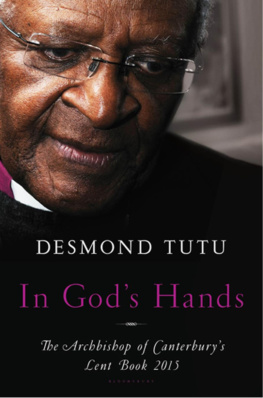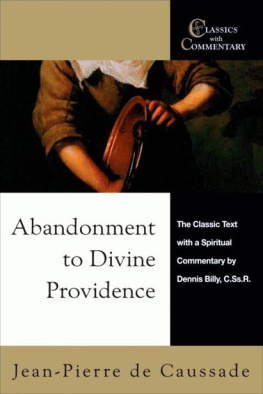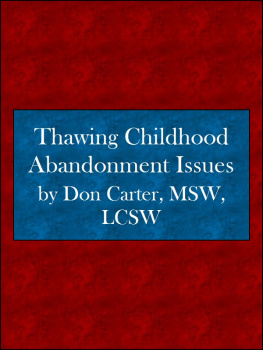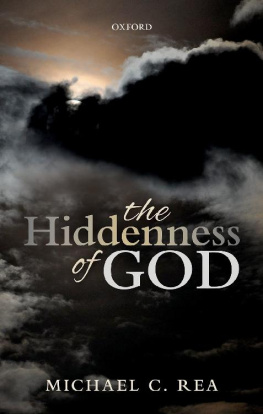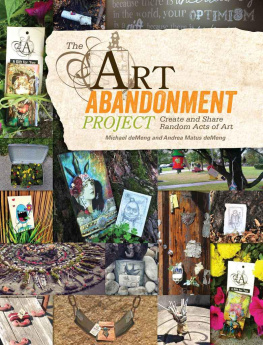Into Your Hands, Father
WILFRID STINISSEN
Into Your
Hands, Father
Abandoning Ourselves to
the God Who Loves Us
Translated by
Sister Clare Marie, O.C.D .
IGNATIUS PRESS SAN FRANCISCO
Original Swedish edition:
Fader, jag verlmnar mig t dig
1986 by Karmeliterna Tgarp Glumslv, Tgarp
English translation made by permission of the author
Unless otherwise noted, Scripture quotations have been taken from the Revised Standard Version of the Holy Bible, Second Catholic Edition, 2006. The Revised Standard Version of the Holy Bible: the Old Testament, 1952, 2006; the Apocrypha, 1957, 2006;the New Testament, 1946, 2006; the Catholic Edition of the Old Testament, incorporating the Apocrypha, 1966, 2006, the Catholic Edition of the New Testament, 1965, 2006 by the Division of Christian Education of the National Council of the Churches of Christ in the United States of America. All rights reserved.
Cover art:
Crucifixion. Byzantine mosaic;
Baptistery, Florence, Italy
Scala / Art Resource, N.Y.
Cover designed by Riz Boncan Marsella
2011 by Ignatius Press, San Francisco
All rights reserved
ISBN 978-1-58617-477-4
Library of Congress Control Number 2010931418
Printed in the United States of America
Contents
Your Providence, O Father, Guides!
A Way to Live Continually in Gods Presence
Faith: Seeing the Invisible
You Have Turned My Mourning into Dancing
As Having Nothing, and Yet Possessing Everything
For You, O Lord, Have Made Me Glad by Your Work
Surrendering Our Past
A New Past
A Healthy Memory
Gods Obedience
Does God Will Something at Every Moment?
Try to Discern the Will of the Lord
Openness and Availability
Detachment
Living in the Present
Boundlessness and Unity
True Freedom
Mankinds Rebellion
Surrendering Everything
Let God Act
Saint John of the Cross View
Surrender and Our Own Activity.
Active or Passive?
Peace of Heart
The Prayer of Surrender
A Testimony: Letting Go
Father,
I abandon myself
into Your hands;
do with me what You will.
For whatever You may do I thank You.
I am ready for all,
I accept all.
Let only Your will be done in me
as in all Your creatures.
I wish no more than this, O Lord.
Into Your hands
I commend my soul.
I offer it to You
with all the love of my heart.
For I love You, my God,
and so need to give myself,
to surrender myself
into Your hands,
without reserve,
and with boundless confidence,
for You are my Father.
Brother Charles of Jesus
(1858-1916)
Foreword
The Gospels and spiritual literature point out various practices of importance on the journey to God. We are told to deny ourselves, forgive one another, carry our cross, fast, and give alms. We must also love our neighbor, pray with others and in private, bring our troubles to the Lord, and be peacemakers. All of these things have their place, and nothing may be overlooked, but they may cause us to feel confused and divided, and we might even ask ourselves where we will find the strength to do all that is required. In spiritual reading we are instructed about balanced asceticism, the Mass readings of the day tell of prayer, and the retreat master speaks about love. We are pulled in different directions, and, instead of finding peace, we become restless. What we need most is a central idea, something so basic and comprehensive that it encompasses everything else.
In my opinion that central idea is surrender. One might expect a Carmelite to place prayer at the center. That is what Saint Teresa of Avila and Saint John of the Cross did. But there is another well-known Carmelite, Saint Thrse of Lisieux, who was totally fascinated by surrender. Now abandonment alone guides me, I have no other compass! I can no longer ask for anything with fervor except the accomplishment of Gods will in my soul.
A few years ago, my brother and I visited a Trappist monastery in Bricquebec, France. The monasterys subprior told us of the spiritual journey of the old abbot Dom Vital Lehodey. In the beginning he was completely absorbed by the liturgy, as one would expect of a Trappist monk. Gradually, he discovered interior prayer and wrote his well-known book The Ways of Mental Prayer (Les Voies de Ioraison mentale ), which can be found in most monastery libraries. In the end, he found an even simpler and straighter path and wrote his equally well-known book Holy Abandonment (Le Saint Abandon ). This concept does not contradict the teaching of either Saint Teresa or Saint John of the Cross. If one reads their description of union carefully, one notices that this total abandonment is what constitutes the very essence of union with God.
The life of Jesus shows that it is acceptable to choose surrender as a unifying idea. According to the letter to the Hebrews, he says upon entering the world: Behold, I have come to do your will, O God, as it is written of me in the roll of the book (Heb 10:7), and he finishes his life with an act of absolute surrender: Father, into your hands I commit my spirit! (Lk 23:46). Abandonment is truly the alpha and omega in his life.
We can distinguish between three degrees or stages in surrender. The first stage consists in accepting and assenting to Gods will as it manifests itself in all the circumstances of life. The second is actively doing Gods will at every moment of life. In the third stage, one is so completely abandoned to God that one has become a pliant tool in his hands. Now it is no longer I who do Gods will, but God who accomplishes his will through me. In Saint Thrses words: For a long time, I have no longer belonged to myself, I am totally surrendered to Jesus, so He is free to do with me as He wills.
Accepting Gods Will
A problem many people have today is that they no longer recognize Gods will in everything that happens. They no longer believe in a Providence that allows all that takes place to work for the good of those who love God (Rom 8:28). They say all too easily and superficially: But it is not Gods will that there are wars or that people starve or are persecuted.... No, it is not Gods will that human beings fight with each other. He wills that we love one another. But when evil people who are opposed to his will hate and murder others, he allows this to become a part of his plan for them. We must distinguish between the actual deed of someone who, for example, slanders us and the situation that comes to us as a result of the deed, which was not Gods will. God did not will the sinful act, but from all eternity he has taken into account the consequences of it in our lives. He wills that we grow through those very things that others do to us that are difficult and painful.
There is a deeply rooted tendency in human beings to look at others and their failings. In doing this, we miss what is most essential: to accept and assent to Gods will in our lives, a will that is largely formed by the opposition of others to Gods will. We need only look at Jesus. It was not the Fathers will that his Son be killed, nor did he inspire anyone to kill him. He did will, however, that Jesus would freely be the sacrifice for the sins of mankind. He willed that Jesus would let himself be put to death. Jesus did not say, as we often hear today: But this is not Gods will, this cannot be Gods will. He said: Abba, Father, all things are possible to you; remove this chalice from me; yet not what I will, but what you will (Mk 14:36). For every one of us there is a chalice that the Father offers us to drink. We have difficulty recognizing it as coming from him, since a great deal of its contents comes from other people. Nevertheless, it is the Father who asks us to drink the bitter cup. It was so for Jesus, and it is the same for us.
Next page
